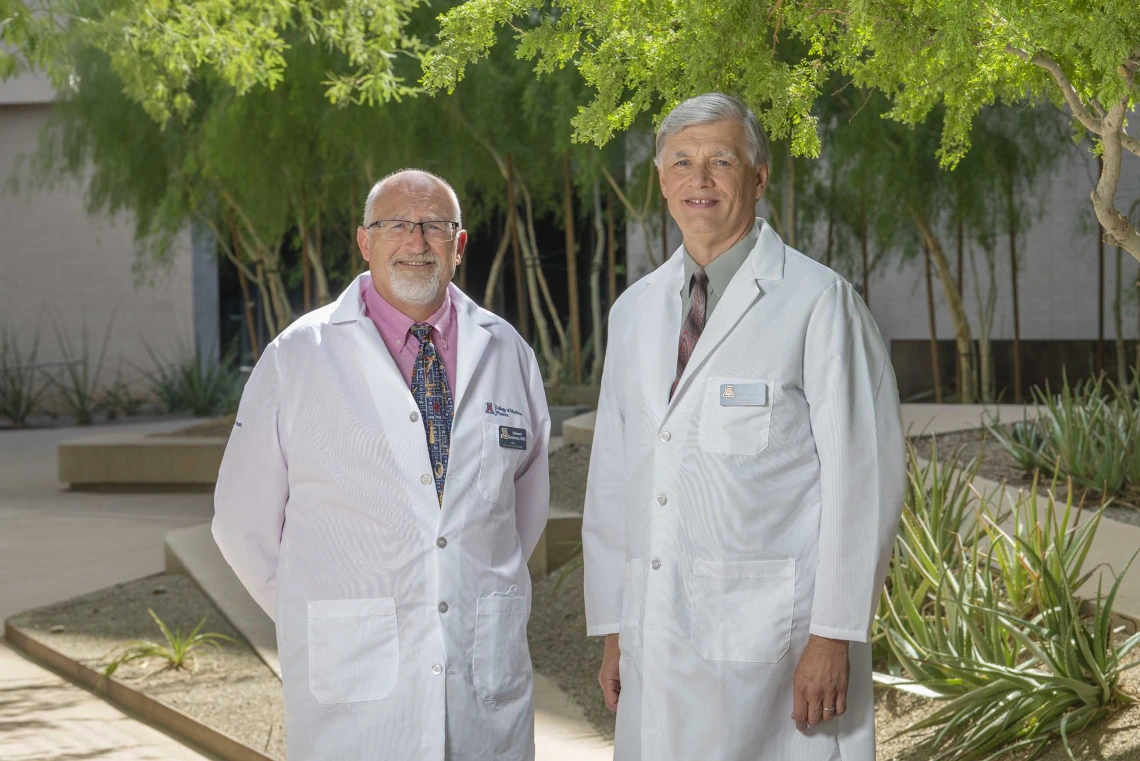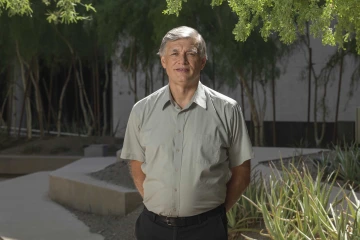College of Medicine – Phoenix’s Stewart Goldman and Vlad Kalinichenko have simple goal — make children’s lives better.

Stewart Goldman, MD, left, and Vlad Kalinichenko, MD, PhD, right, are committed to improving the health and lives of children through their work with the Phoenix Children’s Research Institute, a collaborative effort between the University of Arizona College of Medicine – Phoenix and Phoenix Children’s hospital. (Photo by Noelle Haro-Gomez, U of A Health Sciences Office of Communications)
Stewart Goldman, MD, loves sports, especially team sports. He roots for the Chicago White Sox (the Arizona Diamondbacks are a close second) and is a diehard fan of the WNBA’s Indiana Fever.
That passion for group competitions, as opposed to solo efforts like golf or tennis, is fitting for the acclaimed pediatric oncologist and leader in brain tumor research.
An acclaimed pediatric oncologist and leader in brain tumor research, Stewart Goldman, MD, says pediatric medicine is not just intellectually challenging but personally rewarding because of the special bonds built with families.
Photo by Noelle Haro-Gomez, U of A Health Sciences Office of Communications
“One thing about taking care of a child with a brain tumor is you need to partner with neurosurgeons, with radiation oncologists, physical therapists, speech therapist, nutritionist and a host of other specialists,” said Goldman, the Sybil B. Harrington endowed chair and professor at the University of Arizona College of Medicine – Phoenix Department of Child Health. “And I love that team approach to caring for kids.”
It’s no surprise he’s brought the same collaborative effort to building the Phoenix Children’s Research Institute, recruiting internationally renowned researcher Vlad Kalinichenko, MD, PhD, to be the institute’s founding director in 2023.
“Dr. Kalinichenko believed in our vision of growing this strong research institute together, and I’ll forever be thankful to him for trusting us and taking that leap of faith,” said Goldman, senior vice president of research for Phoenix Children’s hospital. “Now it’s growing at a very good, steady pace.”
The institute is committed to innovative clinical care, the advancement of new therapies for common and rare childhood diseases and improving the emotional, educational and cognitive well-being of children. Last year alone, the institute published more than 300 studies and secured $5.9 million in funding. Several top-level physician researchers have also come on board.
All that investment in research and scientists is a much-needed boost in a fast-growing state that ranks 42nd overall in child well-being, has the second-highest rate of uninsured children in the nation and ranks at the bottom of the nation in primary care physicians per capita.
“We want to be a place of science,” Goldman said. “We want to be a place of change, a place that improves the lives of children.”
The institute, which has secured new grants and published several papers, is making strides, said Kalinichenko, a member of the U of A’s BIO5 Institute.
“It is in a growing mode from both a clinical perspective and from a basic science perspective as a research enterprise,” he said.
Goldman and Kalinichenko’s pediatric dream team is coming together.
“We’re well on our way,” Goldman said.
Teaming up for science – and change
The Phoenix Children’s Research Institute officially formalized the longstanding partnership between the U of A College of Medicine – Phoenix and Phoenix Children’s. The institute includes more than 700 active studies, 640 research investigators and over 100 research staff members made up of scientists, associates, biostatisticians, pharmacists, nurses and coordinators. Its scientists engage in research across multiple clinical disciplines, including cancer, neurology, neonatalogy, cardiology and pulmonology.
Before coming to the U of A, Kalinichenko was director of the Center for Lung Regenerative Medicine and the endowed chair in regenerative medicine at Cincinnati Children’s, where he’d been for 16 years. The chance to build a pediatric research institute from the ground up was a great opportunity, he said. Plus, the institute is all about bench-to-bedside — or translational — research, which can lead to innovative clinical care and new therapies that can be used in the fight against childhood diseases, according to Kalinichenko.
“It’s the most important part of research,” he said.
His eponymous lab, the Kalinichenko Lab, has a long-standing interest in several congenital lung diseases that affect the pediatric population. It studies new treatments for lung diseases in premature babies, who are often born with undeveloped lungs. The lab was one of the first in the world to use pluripotent embryonic stem cells to generate bioengineered lung tissue for potential use in lung regeneration after injury or illness. In August, Kalinichenko’s research team was awarded nearly $6 million for two four-year National Institutes of Health grants.

In just the last few years, Vlad Kalinichenko, MD, PhD, and his research team have secured nearly $9 million in National Institutes of Health grants for new treatment methods in pediatric lung diseases. (Photo by Noelle Haro-Gomez, U of A Health Sciences Office of Communications)
“These rare diseases, which are currently not treatable, deserve to have our attention,” Kalinichenko said. “We need to do everything we can to rescue these babies and give them a chance for survival.”
Both grants focus on using innovative nanoparticle-based delivery with the “stealth” property to treat bronchopulmonary dysplasia and alveolar capillary dysplasia in the lungs without harming cells in other organs of the body.
Normally when nanoparticles are injected intravenously, they’re dispersed throughout the body and can trigger an immune response that harms other organs, like the liver or kidneys. Kalichenko’s lab discovered a way for its nanoparticle-based gene therapy to go directly to the lung vasculature without causing damage to other organs. The other grant focuses on using nanoparticles during a short treatment window to restore lung capillary function damaged by a genetic mutation.
These grants follow Kalinichenko’s $3 million grant last year from the National Institutes of Health that is being used to develop innovative treatment methods, including therapy with donor endothelial progenitor cells, for lung diseases in premature infants.
Other groundbreaking institute research last year came from Tanya Kalin, MD, PhD, a professor at the U of A College of Medicine – Phoenix Department of Child Health and Internal Medicine as well as vice chair of translational research for the Phoenix Children’s Center for Cancer and Blood Disorders. She is also a member of the BIO5 Institute and happens to be married to Kalinichenko.
A breakthrough study from Kalin’s lab revealed a novel method for preventing the spread of lung cancer. The research demonstrated a new treatment approach that improves the effectiveness of chemotherapy by stabilizing tumor blood vessels.
Goldman also leads a few clinical trials, including one investigating the safety and feasibility of using low-intensity electric fields to disrupt cancer cell growth coupled with radiation therapy to treat children with highly aggressive brain tumors.
That driving passion to move science forward not only fuels new discoveries but also hopefully attracts the next generation of pediatric physicians, Goldman said.
Recruiting new talent
Along with groundbreaking research and bringing top research talent to Arizona, Goldman and Kalinichenko want more students to follow in their footsteps. They’re fighting against a trend of declining pediatric residencies.
“In my specialty, pediatric oncology, a third of the programs didn’t fill their fellowships,” Goldman said.
As much as he enjoys research, Kalinichenko said he loves mentoring others.
“My goal is to make as many physician-scientists in pediatric translational medicine as I can,” he said. “For me, the biggest satisfaction comes from training students who become physician-scientists or go to companies to develop more technology, which is then used to improve patient care.”
Goldman said pediatric care is not only intellectually challenging but also emotionally rewarding.
“You establish relationships with really wonderful children and wonderful families, and they allow you, at the worst time in their lives, to be part of their family,” Goldman said. “I’m very proud of what we’re building at the Phoenix Children’s Research Institute. I’m very proud of the changing culture where we can learn from every child because, really and truly, what better way can we honor the children who we’ve served than to learn from them so we can better serve children in the future?”
SOURCE: https://healthsciences.arizona.edu/news/stories/u-works-build-pediatric-powerhouse-institute
